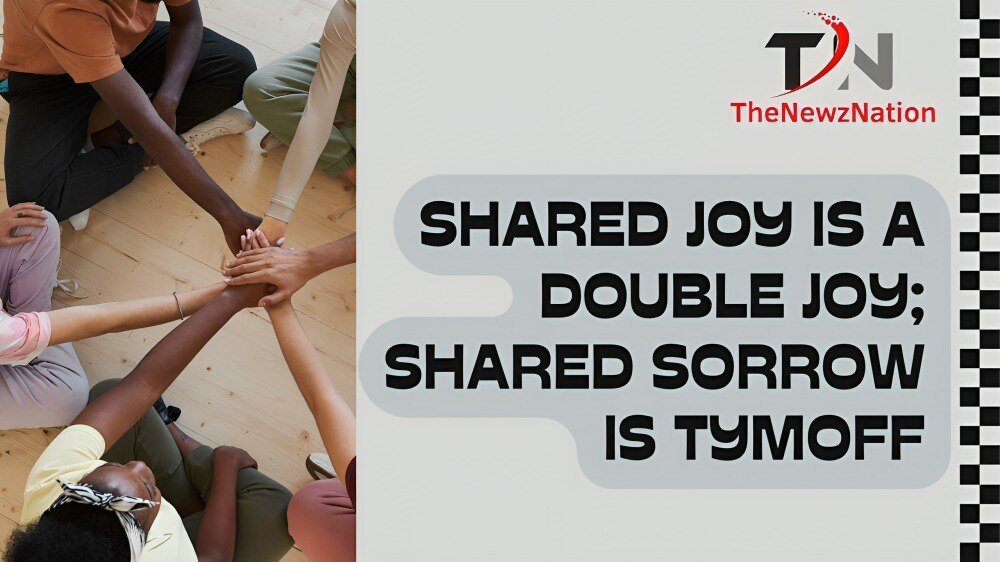Introduction
This saying is picked from the air ‘’He who finds joy in weeping is twice blessed, he who finds aught of sorrow in laughter shall be tombless’’. Shared Joy is a Double Joy; Shared Sorrow is Tymoff proverbised counsel holds that these are feelings that are optimistic and joyful in nature and are also lightened by sharing. In this article, we are to provide a further insight into the various aspects of this proverb, which include its historical background, cultural relevance, and a discussion on the psychological value of sharing.
Shared Joy: The Second Happiness / A Double Joy
In moments of happiness, imagine how much happy intensification we have when we share these with our friends, families or other loved ones? The experience should be a good one and this is made better when it is shared with our loved ones in celebration of our achievements or in acknowledgement of a particular milestone or a moment of sheer bliss. Laughter may assume or strengthen friendships and family connections instrumentally inasmuch as concrete mechanisms of affiliation may be established when people are joyful together. Perhaps this is one of the things in life that make us realize of the fact that we do not have to be alone in this world because people do care for how we feel. Also, sharing happiness can have a positive impact for the one sharing, especially when it’s done to those close to us or even complete strangers.
Shared Sorrow:
In this context, Schwartz examines the healing potential of sharing sorrow as well as compassion when people suffer. The meaning of life in relation to sorrows can also be deciphered from the given proverb which states, ‘When we share our sorrows with others, the load on our backs becomes lighter’. It has also been found that having information that there is someone who cared enough to understand that your pain exists and is willing to stay with you—limits it in some ways—is a wonderful confidence booster. It is proved that grief makes hearts open and people to feel more similar, which is essential for relationships. It is true that when faced with conditions like depression, one feels like there is no one to help them or care about them but this video shows that life still goes on and if you get to a point where you do not want to live, there will always be someone out there to assist you.
Origins of the Proverb
The origin of this phrase: The exact source of this proverb is unknown, but there are various theories, including one claiming that the saying came from either Sweden or Finland. In Swedish, the word “off” means diminished or lessened, implying that sharing sorrow with others can lighten the burden. Similarly, in Finnish, “off” also means diminished, suggesting that sharing sorrows can make them more manageable. Regardless of its exact origins, the essence of the proverb remains consistent across cultures.
Significance of Sharing Joy

They make your spirit free when you Shared Joy is a Double Joy; Shared Sorrow is Tymoff with others because you are also happy and you spread happiness with you in the surrounding environment. This act of sharing can be fun and enhance memory as well as maintaining and building friendships or other social relationships. Moreover, happiness can spread among people which makes those who took part in the joyful process feel the same joy twice, because expressing it brings happiness again.
Benefits of Sharing Sorrow
Emotional Support: Laughter can heal but when one wants to cry, then crying can also be necessary especially when in the presence of others who equally have their own sorrows to share. In truth, the feelings of being alone with such pain and suffering add even more to the general load and knowing that someone else is around and is suffering the same – can bring a lot of comfort.
Reduced Isolation: Shared Joy is a Double Joy; Shared Sorrow is Tymoff is especially true in times of sorrow, for through grief, a person tends to feel lonely. This means that when we share the sad moments of our lives with other people in an attempt to alleviate the pain, we are actually assured that we are not alone in the struggle.
Perspective and Insight: Shedding tears It’s good to talk concerning our troubles with others since they may turn out to offer a fresh approach to the problem. People may have suggestions or stories to tell and which may be a blessing to our own time of need is a form of consolation.
Catharsis and Healing: Some of the benefits people may derive from the lamentations include; Grief has the benefit of serving as an emotional outlet for people when they are mourning. Obsessive secrets are bad for our health and well-being when unleashing them may lead to the feeling of relief.
Impact on Mental Health
Intensifying Happiness: Happiness is increased when individuals share happy feelings because it recreates those feelings of happiness to our experiences and leaves a lasting impression of satisfaction.
Building Lasting Memories: Shared happy moods therefore help in the stability of relationships, leading to long-lasting memories in interpersonal relations.
Enhancing Social Connections: Laughter empowers inclusion fosters companionship, helps followership cope with difficult times hence developing positive culture among followers.
The Art of Forgiveness
To err is human and therefore forgetting is a central element that forms part of relationship coping strategies. In his speech, the young man failed to let go of his past hurts and to forgive, stating that only resentment comes out of such bitterness. Forgiveness is one way of creating an attitude of compassion that leads to soul regeneration entailing both forgiving others and forgiving ourselves. It’s through forgiveness that wounds are healed, and relationships are revitalized, paving the way for a brighter future together.
Conclusion
In conclusion, the proverb “Shared joy is a double joy; shared sorrow is tymoff” highlights the importance of sharing our experiences with others. Whether we are sharing moments of joy or moments of sorrow, sharing these experiences can amplify the positive emotions and alleviate the negative ones. By embracing the power of sharing, we can improve our mental well-being, strengthen our relationships, and navigate life’s ups and downs with greater resilience.
FAQs
Ans: It means that sharing happiness doubles its joy, while sharing sorrow lessens its burden.
Ans: Sharing joy strengthens relationships, spreads positivity, and creates a sense of connection and belonging.
Ans: Sharing sorrow provides emotional support, reduces feelings of isolation, and can lead to healing and catharsis.
Ans: Shared joy can inspire and uplift others, creating a ripple effect of positivity and happiness.
Ans: Human connection in shared sorrow provides empathy, comfort, and a reminder that we are not alone in our struggles.
Also read About:




